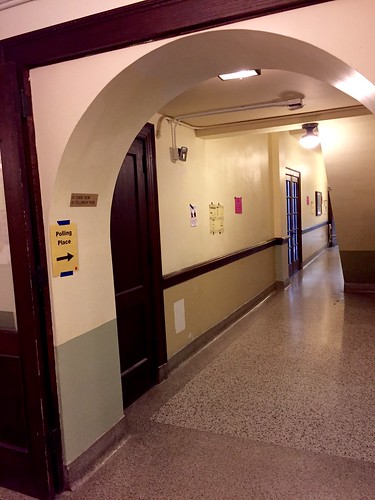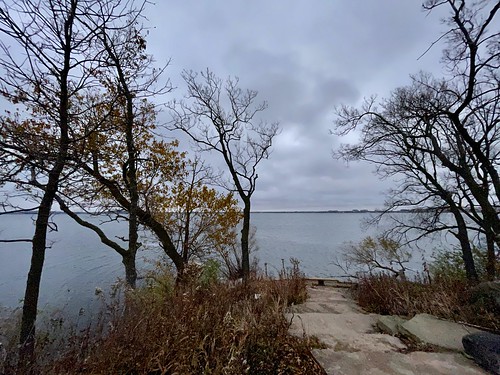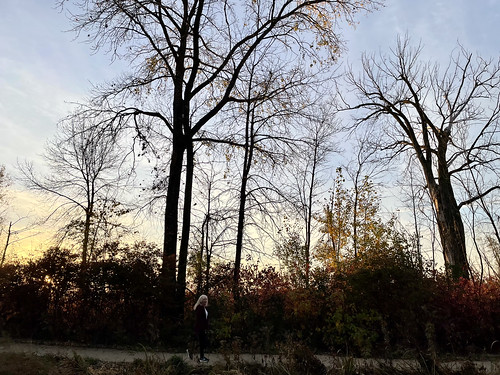
November 13, 2021
Deer at sunrise.
"On the dubious assumption that the Mandate does pass constitutional muster—which we need not decide today—it is nonetheless fatally flawed on its own terms."
"Indeed, the Mandate’s strained prescriptions combine to make it the rare government pronouncement that is both overinclusive (applying to employers and employees in virtually all industries and workplaces in America, with little attempt to account for the obvious differences between the risks facing, say, a security guard on a lonely night shift, and a meatpacker working shoulder to shoulder in a cramped warehouse) and underinclusive (purporting to save employees with 99 or more coworkers from a 'grave danger' in the workplace, while making no attempt to shield employees with 98 or fewer coworkers from the very same threat). The Mandate’s stated impetus—a purported ‘emergency’ that the entire globe has now endured for nearly two years,' and which OSHA itself spent nearly two months responding to—is unavailing as well. And its promulgation grossly exceeds OSHA’s statutory authority."
From the 5th Circuit opinion, which came out yesterday, extending the stay of OSHA’s Emergency Temporary Standard "pending adequate judicial review" of the motion for a permanent injunction.The news of "moral panic."
"The form-fitting dresses and retro color palette that Sinema favors are a way of broadcasting her bona fides as a middle-class politician and thus someone in step with middle-class values."
Another article about Kyrsten Sinema's clothing in the NYT. This one is "How Kyrsten Sinema Uses Clothing to Signal Her Social Class" by Tressie McMillan Cottom, who is "an associate professor at the University of North Carolina at Chapel Hill School of Information and Library Science, the author of 'Thick: And Other Essays' and a 2020 MacArthur fellow."
"I wish students had the choice of either writing essays or speaking them."
November 12, 2021
"Sucking in the stomach and keeping your abdominal muscles tense as you go about your day might seem innocuous, but... [it] can have physical and mental consequences over time."
"UW-Madison told its employees on Thursday that they must be vaccinated by early 2022 to comply with a vaccine mandate for federal contractors."
"How old would you be if you didn’t know how old you were?"
An interesting question, attributed by many people — including the President of the United States — to Satchel Paige. I'm encountering it this morning because Instapundit linked to a Pajamas Media item called "Joe Biden Refers to Satchel Paige as 'The Great Negro.'" Yeah, Biden ought to speak more fluently, but he was obviously trying to say "the great Negro Leagues pitcher" and got tripped up, perhaps because he knows you're not supposed to say "negro" without "leagues" immediately after it.
Quick! Say "Leagues" or there's big trouble! Could everybody just calm down?
Anyway, Biden was just trying to get to the quote, "How old would you be if you didn’t know how old you were?" I hadn't seen the thought put like that, which seems a bit like a Zen koan. I like it! I certainly like it much better than the very trite "You're only as old as you feel" or this meme I saw on Facebook recently: "The sad part about getting older is that no one can see you're still young on the inside."
What does "feeling old" consist of? Each of us has our own internal experience, which includes a lot of imagining how other people feel, and if you are old but think you "feel young," aren't you just saying you don't feel the way you — with your anti-oldness prejudice — have ascribed to various old people who are not you? But how do you know how they feel? It's a big bundle of bias.
Anyway, I like the format of the observation in "How old would you be if you didn’t know how old you were?" But did Satchel Paige originate it? I was pleased to see that Quote Investigator has looked into this already. It found the quote in a 1927 sermon that was discussed in a New York newspaper. Satchel Paige supposedly said it on his 47th birthday, which was in 1953.
"It was a Razzie-worthy performance in my view, but I’m not the target audience for this sick show."
The Rittenhouse murder trial is being prosecuted in front of a nearly all-white jury, before a white judge who uses conservative lingo to describe protesters, in a country where white vigilantism is often excused, if not worshipped. In that context, Rittenhouse’s tears, real or not, have tremendous value. There’s a type of person who is vulnerable to emotional appeals from violent white men, and Rittenhouse’s attorneys only need one of 12 jurors to fit the profile to win this case....
From the outset, the Rittenhouse murder trial has been theater, with a cast of characters who are seemingly meant to vindicate conservatives’ violent hero worship. Rittenhouse’s waterworks were an essential part of the act, painting him as a reluctant killer instead of a boastful one. His acquittal would set a dangerous precedent, but it could be the finale we’re headed toward.
November 11, 2021
At the Rainy Day Café...
... there's no photograph — I didn't go out — but you can talk about whatever you want.
"One would think... that Democrats... would be more than happy to defend the idea that racism exists at every level of American schooling and tout the work of educators to address inequality."
"We are heating Europe, but they still threaten us with closing the border. But what if we cut off [gas] for the Poles and, for example, for the Germans? What will happen then?"
Said President Lukashenko of Belarus, quoted in "Huge far-right protest in Warsaw as Poland-Belarus border crisis intensifies" (London Times).
"Then we hit the 'My Cousin Vinny' point in the cross. For those of you who are sadly unfamiliar with the best law-themed movie ever produced..."
Are you ready to accept Nicole Kidman as Lucy? Javier Bardem as Desi?
WaPo's fact checker casts doubt on Robert A. Caro's "The Power Broker."
"I’m still surprised that some people were surprised when I pointed to the fact that if a highway was built for the purpose of dividing a White and a Black neighborhood or if an underpass was constructed such that a bus carrying mostly Black and Puerto Rican kids to a beach — or that would’ve been — in New York was — was designed too low for it to pass by, that that obviously reflects racism that went into those design choices."
The question isn't whether Buttigieg got it wrong, but whether the massively respected Robert A. Caro got it wrong in his 1974 book about Robert Moses. And Kessler finds that in the years since the publication of the book, significant doubts have been raised about the part — 2 pages — containing the anecdote about the motivation for the height of the underpasses.
Caro's only source for the story was Sidney M. Shapiro, "a close Moses associate and former chief engineer and general manager of the Long Island State Park Commission."
"The lack of trend is the trend."
"If Biden were to back down now, I don’t know that it would lower the political temperature. It might even inflame the issue and embolden the opposition."
"Linus is annoying Lucy, wheedling and pleading with her to read him a story. To shut him up, she grabs a book, randomly opens it..."
From "The Comfort Zone/Growing up with Charlie Brown" by Jonathan Franzen, published in The New Yorker on November 21, 2000.
November 10, 2021
"On the stand, Kyle Rittenhouse begins to sob loudly as he describes how he was 'cornered' in a parking lot by Joseph Rosenbaum, the first man that he shot and killed."
Writes Julie Bosman live-blogging the trial in the NYT.
EARLIER: At the same link, Mitch Smith analyzed whether it would be in Rittenhouse's interest to testify:
By taking the witness stand, Kyle Rittenhouse could look jurors in the eyes and try to convince them that he was scared for his life before he shot three men last summer in Kenosha, Wis. But doing so would also open himself up to a grilling by prosecutors, who are likely to accuse him of stirring up trouble and opening fire without reasonable fear that he would be killed or badly hurt.He didn't merely look the jurors in the eye and try to convince them, he seemed to relive the experience and to be overtaken with trauma, crying in a way that could not be faked. It was very real and convincing that he is suffering. One might attempt to argue that he feels sorry for himself, and he was reliving the horrible moment his life went to hell, and the men he killed are not alive to cry and win our sympathy, but I think his show of emotion will impress at least one juror that he felt truly cornered.
AND: Here's video of today's testimony. Scroll to the parts where the judge is talking (scroll to 1:21:00 to catch the judge's fiery attack on the prosecutor).
"Did she really clear the room of staff by saying she wished to masturbate, or was it the cheddar and crackers I foolishly had before bed?"
Writes Deborah Ross in "A riveting cheese dream of a film: Spencer reviewed/Kristen Stewart looks nothing like Diana but is somehow Diana. I think it’s called ‘great acting’" (The Spectator).
"I regret that I did the same on a Monty Python show, so I am blacklisting myself before someone else does."
Not much fun in Stalingrad, no...I was looking forward to talking to students at the Cambridge Union this Friday, but I hear that someone there has been blacklisted for doing an
— John Cleese (@JohnCleese) November 10, 2021
impersonation of Hitler
I regret that I did the same on a Monty Python show, so I am blacklisting myself before someone else does
"More than a third of East High School's student body stayed home Tuesday, a day after police used pepper spray to put down numerous fights, which were followed later Monday by..."
That's from the Wisconsin State Journal, linked and discussed here at Reddit. East High School is in Madison, Wisconsin.
"[A] successful metaverse needs to have ways to make money. If you buy a Chanel bag, you also get to have it as an NFT in your metaverse."
From "Why Facebook’s Metaverse Is Dead on Arrival" by James D. Walsh (NY Magazine).
November 9, 2021
Unhappy marriages, circa 1970.
1. "Crossroads" by Jonathan Franzen. This is a 2021 novel — 600 pages — that I just finished. It takes place mostly around Christmas 1971 and Easter 1972. The parents have an early-70s-style struggle with marriage, and one of their offspring — the troubled genius son — is named Perry.
2. "Diary of a Mad Housewife" is a movie that came out in 1970. I watched it because I was reading "Crossroads," and I got the idea that it might have influenced Franzen and that the name Perry was intended as a clue. The director of the movie was Frank Perry, and the screenplay was by his wife Eleanor Perry. I'd never seen this movie before, even though I saw tons of movies in 1970. I think I avoided it because I didn't want to get bogged down in the problems of a subordinated housewife.
Anyway, I enjoyed both works of art, even though I didn't identify with either married couple. "Crossroads" had a younger generation that got caught up in events and ideas that affected me when I was young, and "Diary of a Mad Housewife" had little to do with the 1970s that I lived through. It was about awful people of a sort that I avoided. But what a spiffy work of art.
I especially liked the 2 male actors — the husband played by Richard Benjamin and the lover played by Frank Langella. Benjamin was comically repellent and his odd looks intensified the effect. I said he looked like Pete Buttigieg, and Meade said take Pete Buttigieg and add Mr. Bean (Rowan Atkinson):
Where is Jake Tapper's bullshit detector?
I follow Jake Tapper on Twitter, but I do not appreciate getting spammed by his "liking" phony-baloney statements from celebrities, like this:

It's one thing to have to see junk like this on Facebook, where I encounter various nice people I know who unthinkingly pass along inspirational "quotes" that would cause an educated sensible person to question whether that celebrity could have said that.
"He kept screaming, 'I can’t breathe.'"
"Maybe because it’s hard to write a drama in which the villain hasn’t done anything terrible yet, Greenhouse makes an uncharacteristic misstep in a brief excursus that compares the new justice to the late Phyllis Schlafly."
"The prosecutor with his head in his hand near the end here is just brutal."
The prosecutor with his head in his hand near the end here is just brutal. https://t.co/jpghuE5SVS
— AG (@AGHamilton29) November 8, 2021
X is my religion, I googled, because I'd just read "Sex, to me, should be a religion."
I was rereading the previous post, which included that quote, from the diaries of Patricia Highsmith, and it called to mind a subject I blogged 2 weeks ago.
John McWhorter has a new book — "WOKE RACISM/How a New Religion Has Betrayed Black America" — premised on the idea that wokeism is a religion:
"I do not mean that these people’s ideology is ‘like’ a religion. I seek no rhetorical snap in this comparison. I mean that it actually is a religion. An anthropologist would see no difference in type between Pentecostalism and this new form of antiracism."In my post about that, I quote Bob Dylan: "To her, death is quite romantic/She wears an iron vest/Her profession’s her religion/Her sin is her lifelessness."
So now I had 3 statements — sex is a religion, a political ideology is a religion, and a profession (prostitution?) is a religion. Looking for more things that fit this set, I googled "X is my religion." I landed on a Know Your Meme entry, "What's Your Religion?"
What's Your Religion is an exploitable image series featuring a screenshot of a text message conversation in which a bizarre image in sent in response to the question "What's your religion?," leading the recipient to say "I'm interested."...
On August 31st, 2016, Redditor cortexer submitted a screenshot of a text message conversation in which a person asks "Are you religious? I'd like to introduce you to my religion" followed by a picture of a Teletubby doll hung on a crucifix and the reply "I'm interested"...Later, on Reddit, there's a discussion of whether this really is a meme, and somebody says it's "never been used widely enough to be normified" — the test of whether something's a meme? — and somebody else says "No, its too offensive for the normies to use." It doesn't strike me as offensive at all. It's silly, and it's a way to be playful about saying that you're not serious about real religion.
"She was always half-broke. When you date women, she joked, there’s no man to grab the check...."
November 8, 2021
"The 16-year-old girl sat beside her alleged kidnapper, looking out the car window at the other people on the road — people who could save her, if they only knew what was happening."
"Giving a description of yourself for the benefit of blind or visually impaired people – when meeting a group of people for the first time; when speaking at a conference or seminar – is good practice, and part of your professional responsibilities."
In the comments at my post, Lurker21 said:
Even if you accept that saying your race and gender before large groups of people is now appropriate and necessary you might puzzle over why physical descriptions of the face became necessary before references to sexual orientation. Maybe a large part of the audience is blind (but not blind from birth since visual appearance wouldn't mean so much to them)?
And it turns out these extended descriptions of looks do seem to be motivated by a desire to include the blind. I'm sure the blind are aware that they are missing something other people are getting, but do they appreciate extra explanations that are just about how people look (as opposed to explanations of nonverbal communication like gestures or things written or drawn on a whiteboard)?
At that VocalEyes website, you're told that, when introducing yourself, you should "restrict yourself to three key elements and one or two sentences." And it's "a political and personal act." There are suggestions about which elements to choose:
"The recommended treatment is stomach removal."
I had just learned I carry a genetic mutation that puts me at an incredibly high risk for a rare stomach cancer. This type of cancer is almost impossible to detect in the early, treatable stages — it lurks in the inner lining of the stomach in a lace-like pattern. By the time endoscopies, which give doctors a view into the digestive organ, can see the webby cancer cells forming, they've usually spread to other organs and the disease is incurable....
She decides to get the surgery. Wouldn't you? The description of life without a stomach isn't as bad as what I imagined:
But after a year, many people go back to eating all the things they did before surgery, with small portions and a lot of chewing.
I pictured nothing but Ensure, but she is "able to get all the pleasure from food I always have."
Click through to see her description of all the things she ate when she knew she'd be losing her stomach. But the good news is, she can still eat those things, just in small bites and with a lot of chewing (and with the benefit of knowing she's shut stomach cancer out of her future).
"The deed is done. Too late trying to convince me of anything now."
I blogged, 5 years ago today, with this photograph:

"Meade and I walked over to the First Congregational Church, walked through the dark hallways, and passing us right at this point was a young man in a black T-shirt that said in big letters: TRUMP. I'm keeping my privacy about how I voted, so don't even ask. I wish the best for my fellow Americans and hope that whatever happens, you'll be able to handle it."
Has Althouse said why her vote will be private this time? (or were past votes initially private as well? Can't remember, but I don't think so?) That's what I'm curious about, and what it means in the abstract if it can be extrapolated in any way to the thinking and behaviour of other voters. I could hypothesize that as a blogger she just doesn't want the distraction and inherent uselessness of knee-jerk blowback in the comments for the next four years, either way. Or that she perceives some value to the blog in being formally inscrutable. Or that she is being practical given that her commenters and perhaps her readers too lean right, and she has already sensed a shift in tone at times that suggests prudence. I wonder, too, if she and Meade voted the same way or differently.Did I ever reveal how I voted? I think I eventually did, but I can't remember why or where. I wasn't happy with the choice! I wasn't happy in 2020 either, but in 2020, I revealed who I voted for: No one!
"We unearthed this hunk of tuber, and we thought to ourselves, ‘what is this? Was it some sort of a strange fungal growth?'"
"In Mississippi in 1947, two Black teenagers asked for fried chicken and watermelon before they went to the electric chair. Professor Green painted one ornate platter for each boy."
She planned to paint the meals until capital punishment was abolished, or until she had made 1,000 plates, whichever came first. In September, she painted her 1,000th plate, an oval platter with a single familiar image: the bottle of Coca-Cola requested by a Texas man in 1997. She died a few weeks later....
The plates are white china with the image of the food done in cobalt blue glaze. She got the idea to do this project when she read about a man whose last meal choice was glazed doughnuts. The obituary writer does not note the glaze/glaze inspiration/coincidence. It's just put there for us to see.
Nor does the obituary discuss race, even though — out of all those 1,000 plates — one of the choices it highlights is the fried chicken and watermelon that 2 black teenagers wanted. For many years, it has seemed verboten to mention fried chicken or watermelon in connection with black people. What is it about this context that made it seem okay?
Is it just that Julie Green — who looks white in the photograph — has died? Is it that she meant to express empathy for the condemned? But she systematically commemorated any condemned person who was given a meal choice. The obituary chose which examples to isolate. I was surprised to see this breach of taboo.
The author of the obituary is the NYT style writer Penelope Green. No relation to Julie Green, I presume. I see I have a tag for Penelope Green, and I see that I have especially enjoyed her writing — about Marie Kondo (here), Cat Marnell (here), and new urban communal living, blogged here: "And another thing I like about Penelope Green is: She put 'social justice' in quotes."
I wonder what Penelope Green really thought about Julie Green's art project. An obituary writer can't inject criticism. Or can she?
November 7, 2021
"So why the raids? Since when does the FBI [conduct] raids over missing diaries?"
Project Veritas decided not to run the story because it could not verify that the diary belonged to [Ashley] Biden... Instead, it alerted the police, according to [James] O’Keefe: “Project Veritas gave the diary to law enforcement to ensure it could be returned to its rightful owner. We never published it.” ...What is the alleged federal crime (and what is the precedent for a major federal investigation over such an alleged theft)? What precautions were taken by the Biden Administration in light of the claimed media status of the targeted individuals? Why was there a delay in this action being taken if the alleged theft occurred a year ago? Has this matter been under investigation for a year and did the White House request the intervention of the FBI?
"'Spencer' is, in many ways, baloney, abundantly spiced with slander. It is contemptuous of those whom it accuses..."
Writes Anthony Lane in The New Yorker, reviewing the new movie "Spencer," about Princess Diana, played by Kristen Stewart. Here's a trailer for the movie.
"This is exactly what it feels like to cancel cable. This is not a sketch, it's a documentary."
"[P]rogressive pedagogies... did not begin in the pandemic or after the murder of George Floyd, but those events accelerated enthusiasm for their adoption...."
Sunrise run.

"The GPS in my car sometimes wants to veer off into off-road travel. Before I make a long trip, I always check the route on my cell phone map..."
"I have argued for years that the conservative-populist coalition was born in 2008 when John McCain became the Republican nominee."
Writes Salena Zito in "The voters revolt against our cultural curators, again" (Washington Examiner)."















